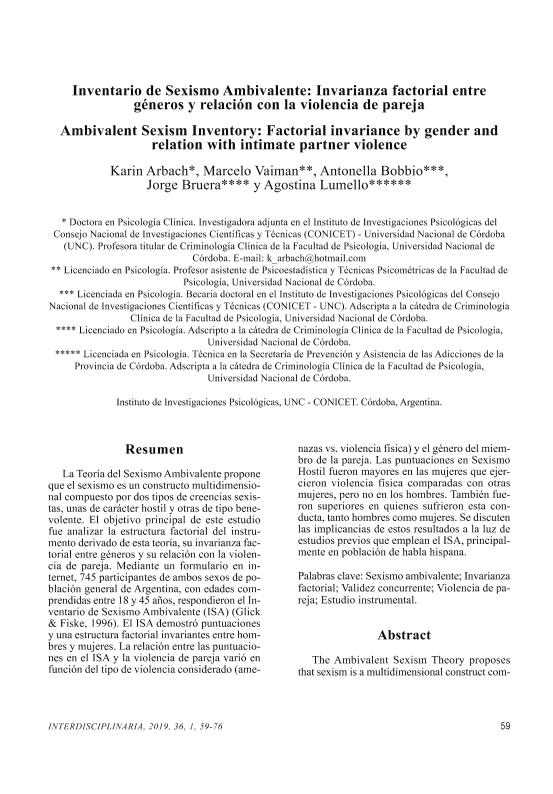Mostrar el registro sencillo del ítem
dc.contributor.author
Arbach, Karin

dc.contributor.author
Vaiman, Marcelo

dc.contributor.author
Bobbio, Antonella

dc.contributor.author
Bruera, Jorge Ángel

dc.contributor.author
Lumello, Maria Agostina

dc.date.available
2021-02-19T16:23:52Z
dc.date.issued
2019-06
dc.identifier.citation
Arbach, Karin; Vaiman, Marcelo; Bobbio, Antonella; Bruera, Jorge Ángel; Lumello, Maria Agostina; Inventario de Sexismo Ambivalente: Invarianza factorial entre géneros y relación con la violencia de pareja; Centro Interdisciplinario de Investigaciones en Psicología Matemática y Experimental Dr. Horacio J. A. Rimoldi; Interdisciplinaria; 36; 6-2019; 59-76
dc.identifier.issn
1668-7027
dc.identifier.uri
http://hdl.handle.net/11336/126090
dc.description.abstract
La Teoría del Sexismo Ambivalente proponeque el sexismo es un constructo multidimensional compuesto por dos tipos de creencias sexistas, unas de carácter hostil y otras de tipo benevolente. El objetivo principal de este estudiofue analizar la estructura factorial del instrumento derivado de esta teoría, su invarianza factorial entre géneros y su relación con la violencia de pareja. Mediante un formulario en internet, 745 participantes de ambos sexos de población general de Argentina, con edades comprendidas entre 18 y 45 años, respondieron el Inventario de Sexismo Ambivalente (ISA) (Glick& Fiske, 1996). El ISA demostró puntuacionesy una estructura factorial invariantes entre hombres y mujeres. La relación entre las puntuaciones en el ISA y la violencia de pareja varió enfunción del tipo de violencia considerado (amenazas vs. violencia física) y el género del miembro de la pareja. Las puntuaciones en SexismoHostil fueron mayores en las mujeres que ejercieron violencia física comparadas con otrasmujeres, pero no en los hombres. También fueron superiores en quienes sufrieron esta conducta, tanto hombres como mujeres. Se discutenlas implicancias de estos resultados a la luz deestudios previos que emplean el ISA, principalmente en población de habla hispana.
dc.description.abstract
The Ambivalent Sexism Theory proposes that sexism is a multidimensional construct composed of two types of sexist beliefs, on the one hand, hostile and, on the other hand, benevolent. The first refers to negative attitudes towards women as weak and inferior to men, and the second refers to the set of sexist attitudes towards women considering them stereotyped and limited to certain roles (i.e. mother, wife, and housewife). The main objective of this study was to analyse the factor structure and factorial invariance by gender of the instrument derived from this theory and its concurrent validity with a measure of intimate partner physical violence. Another objective of the study was to establish comparisons in ISA scores by gender and crossculturally. The Ambivalent Sexism Inventory (ASI) (Glick & Fiske, 1996) was answered through an online form by 745 participants of both sexes from an Argentinean general population sample aged between 18 and 45 years old. By means of a confirmatory maximum likelihood factor analysis the data in this sample showed a good adjustment to the ASI structure proposed by its authors, this is a one-dimensional factor (SH) and three subfactors (protective paternalism, complementary gender differentiation and heterosexual intimacy) that make up the second-order factor SB. This factorial structure remained invariant when discriminating between men and women. The correlation between both factors was robust and significant (r= .68) both in the general sample, and differentiating by gender. The reliability of the factors and subfactors was between a moderate and high level (α= .62 to .91). No significant differences were found between men and women in the mean scores of the ASI factors and subfactors. Approximately 1 in 3 subjects reported having perpetrated or suffered intimate partner physical violence. In general terms, those who have perpetrated or have suffered violence had higher scores in SH and SB that those who did not, but this effect was only significant in the case of women. The relationships found between ASI scores and intimate partner physical violence varied by gender and violence directionality (suffered or perpetrated). The ASI scores were lower in countries close to Argentina probably due to a sample mainly composed by young women with a high education level. Our results support the idea that ambivalent sexism is an invariable transcultural construct between men and women, and that the ISA is a valid and reliable measure in the Argentine population. The limitations of results are discussed and the implications are analyses in light of previous studies using the ASI, mainly in Spanishspeaking population.
dc.format
application/pdf
dc.language.iso
spa
dc.publisher
Centro Interdisciplinario de Investigaciones en Psicología Matemática y Experimental Dr. Horacio J. A. Rimoldi
dc.rights
info:eu-repo/semantics/openAccess
dc.rights.uri
https://creativecommons.org/licenses/by-nc-sa/2.5/ar/
dc.subject
Sexismo ambivalente
dc.subject
Invarianza factorial
dc.subject
Validez concurrente
dc.subject
Violencia de pareja
dc.subject.classification
Psicología

dc.subject.classification
Psicología

dc.subject.classification
CIENCIAS SOCIALES

dc.title
Inventario de Sexismo Ambivalente: Invarianza factorial entre géneros y relación con la violencia de pareja
dc.type
info:eu-repo/semantics/article
dc.type
info:ar-repo/semantics/artículo
dc.type
info:eu-repo/semantics/publishedVersion
dc.date.updated
2020-11-11T19:21:20Z
dc.journal.volume
36
dc.journal.pagination
59-76
dc.journal.pais
Argentina

dc.journal.ciudad
Buenos Aires
dc.description.fil
Fil: Arbach, Karin. Universidad Nacional de Córdoba. Facultad de Psicología; Argentina. Universidad Nacional de Córdoba. Instituto de Investigaciones Psicológicas. - Consejo Nacional de Investigaciones Científicas y Técnicas. Centro Científico Tecnológico Conicet - Córdoba. Instituto de Investigaciones Psicológicas; Argentina
dc.description.fil
Fil: Vaiman, Marcelo. Universidad Nacional de Córdoba. Facultad de Psicología; Argentina. Consejo Nacional de Investigaciones Científicas y Técnicas. Centro Científico Tecnológico Conicet - Córdoba. Centro de Investigaciones y Estudios sobre Cultura y Sociedad. Universidad Nacional de Córdoba. Centro de Investigaciones y Estudios sobre Cultura y Sociedad; Argentina
dc.description.fil
Fil: Bobbio, Antonella. Universidad Nacional de Córdoba. Instituto de Investigaciones Psicológicas. - Consejo Nacional de Investigaciones Científicas y Técnicas. Centro Científico Tecnológico Conicet - Córdoba. Instituto de Investigaciones Psicológicas; Argentina. Universidad Nacional de Córdoba. Facultad de Psicología; Argentina
dc.description.fil
Fil: Bruera, Jorge Ángel. Universidad Nacional de Córdoba. Facultad de Psicología; Argentina. Universidad Nacional de Córdoba. Instituto de Investigaciones Psicológicas. - Consejo Nacional de Investigaciones Científicas y Técnicas. Centro Científico Tecnológico Conicet - Córdoba. Instituto de Investigaciones Psicológicas; Argentina
dc.description.fil
Fil: Lumello, Maria Agostina. Universidad Nacional de Córdoba. Facultad de Psicología; Argentina
dc.journal.title
Interdisciplinaria
dc.relation.alternativeid
info:eu-repo/semantics/altIdentifier/url/http://www.ciipme-conicet.gov.ar/ojs/index.php?journal=interdisciplinaria&page=article&op=view&path%5B%5D=https%3A%2F%2Fdoi.org%2F10.16888%2Finterd.36.1.5
dc.relation.alternativeid
info:eu-repo/semantics/altIdentifier/url/https://www.redalyc.org/jatsRepo/180/18060087004/html/index.html
Archivos asociados
